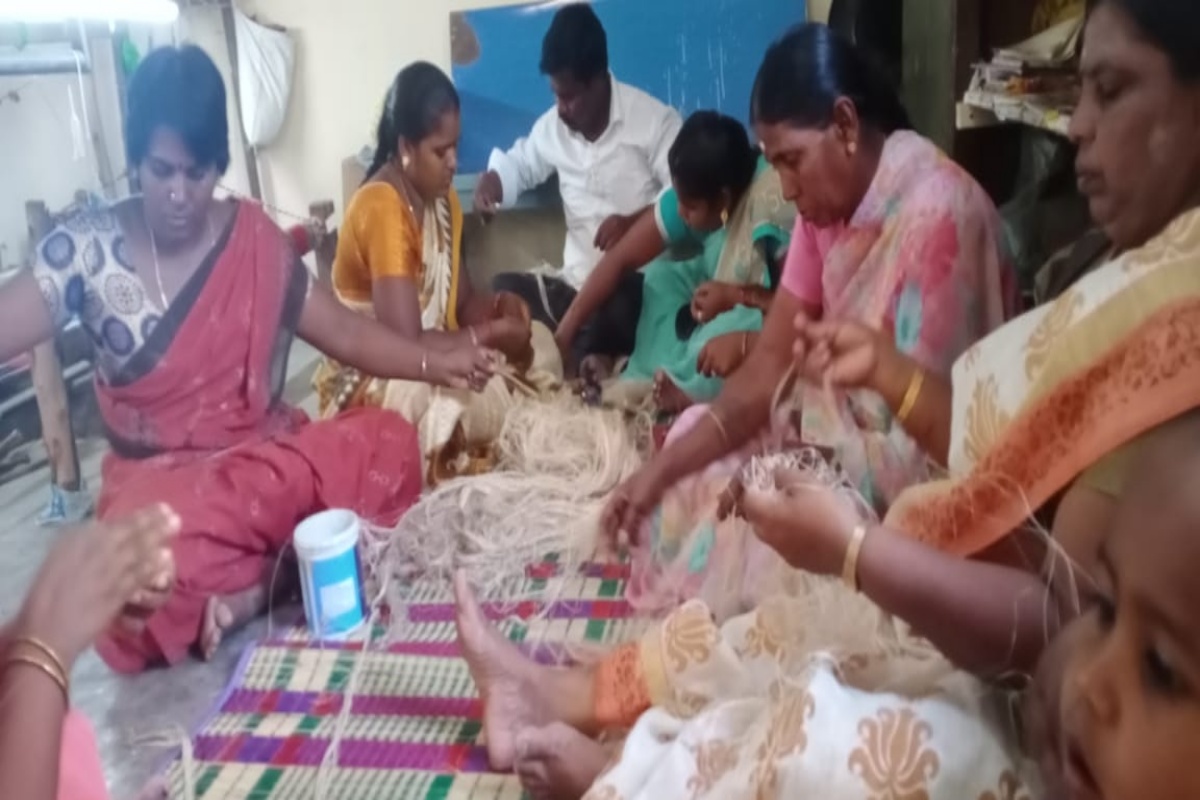Urdi Bazar Jagadhatri Puja Committee spreads message of environmental conservation
The Urdi Bazar Jagadhatri Puja Committee has adopted the theme of saving greenery to protect our environment.
Even though banana stems are available in large volumes, the process of manually extracting fiber out of the stem is a time-consuming one and the stem of banana or pineapple has to be dried and then fibres are manually extracted to make yarn.

This Limca Book of Record holder made saree using 25 natural fibres.
C. Sekar, a third-generation weaver from Chennai’s Anakaputhur had entered the Limca Book of Records in 2011 after he made a saree using 25 natural fibres including banana, jute, bamboo, pineapple and others and even got the appreciation from Prime minister Narendra Modi during his recent Chennai visit.
Anakaputhur is a suburb of Chennai which lies beyond the International airport, on the banks of river Adayar. The place was once noted for its weavers and had a minimum of 5,000 handlooms with each home having at least 5 to 10 of them, but today, due to a competitive industry and failure in marketing, the number of handloom and weavers have declined.
Sekar and his family were traditional weavers, and in the 1970’s it was thriving business with the products being exported mainly to Nigeria in Africa. Checked Madras fabrics were the major product the Anakaputhur weaves were exporting from Chennai and with the change in political climate in Africa there was a ban on imports to that country leading to massive losses to the Anakaputhur weavers.
Advertisement
With the demand for natural products and sustainable products increased and turned into a fashion statement, Sekar thought of transforming his industry into the sustainable mode and tried to make sarees out of banana fibre.
Sekar and his Anakaputhur weavers cluster, which has around 100 people working with a majority of women self-help groups, made yarn out of banana fibre to start with. Bananas and plantains are in abundance in South India and Sekhar uses this large volume of banana plants to convert its fibre to yarn.
The dynamic weaver whose family, including wife S. Padma and Children S. Karthik, S. Mahendran and S. Mohan in the industry, told IANS said, “Indeed, it was a challenge and there was no model, but we worked on it and we created yarn from banana fibres extracted from banana stems. In the past few years, we have sold hundreds of these sarees made out of yarn produced from banana fibre.”
Even though banana stems are available in large volumes, the process of manually extracting fibre out of the stem is a time consuming one and the stem of banana or pineapple has to be dried and then fibres are manually extracted to make yarn.
Natural dyes are used here and mainly turmeric and indigo are used for making these natural dyes.
Sekar says, “The yarn is then treated in various herbs, spices and even cow dung for their antibacterial properties. Medicinal herbs like Tulsi and Mint are also used ensure that skin allergies are at a bay for the users of these clothes including sarees.”
It takes two weavers two days to make a saree and if a single weaver is working on it 4 to 5 days will be required for that. Each Saree costs anywhere between Rs 1,800 to 10,000 but Sekar said that even though there is high demand, the Covid-19 has taken a toll on his business leading to joblessness.
The weaver, who wants to continue with the traditional weaving methods is certain that the quality of the product will see him through the bad times, but is expecting support from the Union Ministry of Textiles and Handloom, which has several programmes for the support of handloom weavers.
Sekar has ambition to take his product to all parts of the globe and to open a retail outlet of his saree in each city of the world and he wants to take a cue from Prime minister Narendra Modi’s vision of taking the “Make in India” tag global.
Advertisement